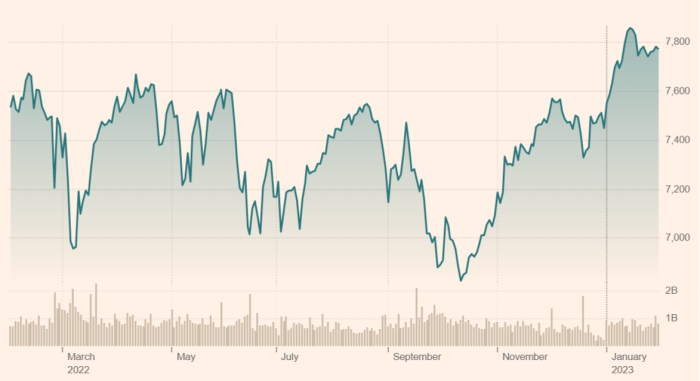The interminable wait for the FTSE 100’s entirely redundant record-high

Like a funnel full of bitumen forever about to drip, the FTSE 100 is oily, dull and ostensibly inert. It’s been three weeks since Bloomberg splashed on the index nearing a record high and still we wait, transfixed for reasons unclear by an experiment seemingly without end.
The FTSE’s up 14 per cent this millennium, so its 7 per cent jump in the month to mid-January caught some level-watchers off guard. A fresh high already within sight and the news otherwise pretty quiet, the FT’s markets desk rushed to prepare a piece for when the champagne moment finally arrived.
Perhaps it never will.
Should anyone care? The Investor Forum clearly doesn’t. From Thursday’s FT:
UK equities are no longer seen as a “must own” asset class, according to a group representing some of the world’s largest investors that has called for a reset in relations with British companies to help drive growth in the market.
In its annual review published on Thursday, the Investor Forum said that “unless companies, investors, regulators and policymakers accept the reality of this situation, UK equities as an asset class will continue to diminish — to the detriment of all economic participants and society more broadly”.
“The declining relevance of UK equity markets over the last 25 years has been breathtaking,” said Andy Griffiths, the group’s executive director.
UK equities last year made up about 2.6 per cent of the Forum’s members’ total assets under management, down from 4.2 per cent in 2019 and 5.7 per cent in 2016.
Irrelevance follows underperformance. Though a bias towards defensives and commodities made the FTSE 100 last year’s top-performing major developed market benchmark, it’s within a dismal longer-term trend, particularly for domestic investors. Ian Harnett, Absolute Strategy Research’s chief investment strategist, says £1,000 invested in the FTSE at its previous peak in May 2018 would have been “eroded almost 20 per cent by inflation and would be worth 10 per cent less in US dollar terms”.
“Even if you added in the 18 per cent returns accrued from the dividends you would have earned, you would still have lagged 30 per cent behind investors in the S&P 500,” Harnett said.
A stock market isn’t the economy, readers often say in the comments below this type of story, which is particularly true of the London market in general and the FTSE 100 in particular. Shunning of UK equities by global investors is nonetheless an embarrassment that government can only address on the home front.
Chancellor Jeremy Hunt last week outlined an economic and prosperity plan (though “not a series of measures or announcements”) to a room full of (sceptical) investors and (job-cutting) Silicon Valley executives. “Being a technology superpower can change our country’s destiny,” Hunt said. “So let’s make it happen.”
Did the assembled audience know, for example, that according to PwC UK GDP could be up to 10 per cent higher in 2030 because of AI alone? Or that McKinsey thinks the global market opportunity for UK green industries could be worth more than £1trn over the next seven years? Why wouldn’t you invest in the UK?
The FT’s Ian Johnston provided a reality check over the weekend:
Leading UK start-ups are accelerating plans to expand overseas as government cuts to research and development tax credits and more generous support elsewhere threaten the UK’s standing as a tech hub …
In November, Hunt cut the rebates available to small and medium-sized businesses in a bid to reduce fraudulent claims, while increasing credits for larger companies. The move has particularly hit start-ups in strategically important industries such as artificial intelligence, biotechnology and climate tech…
…“These [R&D] changes only make other countries more attractive,” said Jacob Nathan, co-founder of Epoch Biodesign. “I’m just not convinced we’re going to scale in the UK now. It just doesn’t make sense”. Tax credits have played a strong role in attracting international investors to UK businesses as well as growing jobs in the country, according to start-ups.
Back to the FTSE 100, which by Tuesday’s close had moved precisely 0.01 per cent in seven sessions. January had been the second-best for global equities in more than three decades, founded largely on optimism around China’s reopening. But global optimism and UK-listed equities can sometimes appear inversely correlated:
Earlier in the day the benchmark had drifted 0.7 per cent after the IMF had – in the words of Kit Juckes, macro strategist at Société Générale – “put on a pair of knuckle-dusters and smacked its UK growth forecast in the nose”. The IMF thinks UK GDP will decline 0.5 per cent between the final quarter of 2022 and the end of this year.
The depth of a UK recession won’t matter much for old-economy stocks like Johnson Matthey, Diageo and British American Tobacco, which had helped pulled the FTSE 100 back to almost flat by Tuesday’s close. To them the UK is not much more than a regulatory regime, a reporting currency and head office address.
Capital Economics’ chief UK economist Paul Dales says the FTSE “isn’t fully braced for the recession that lies ahead” and sees a fall of around 10 per cent to 7,000 by mid-2023, dragged lower in line with a sharp drop in the UK composite activity PMI.
Still, there’s good news out there if you are prepared to believe. Dales expects the FTSE to rebound to 9,500 (!) by the end of 2024 as recessions at home and abroad begin to ease and the prospect of interest rate cuts grows.
Readers shouldn’t expect jubilant “FTSE 100 hits record-high” headlines to cross anytime soon, in other words. And if you think this post was written as an experiment in tempting fate, you would be right.
World News || Latest News || U.S. News
Source link




